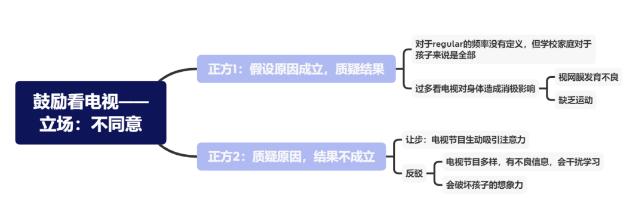Some people believe that children can learn from TV effectively, so children should be encouraged to watch TV regularly both at home and at school. To what extent do you agree or disagree?
题目大意
一些人认为孩子可以从电视有效地学习,所以孩子应该被鼓励在家和在学校有规律的看电视。在多大程度上同意或不同意?
思路解析
题干一句话,讨论一种人们普遍 "观点"。出题方式为 To what extent do you agree or disagree 同意不同意类,需要给出清晰的立场,建议使用倾向型或完全一边倒结构。
话题类型:教育+媒体。话题词:TV;home and school。逻辑词汇:so;regularly
提纲
写作示范
In spite of the fact that the world is undergoing various changes in recent years, education remains one of the most heatedly discussed issues, especially the one related to the appropriate approach of teaching. There are some people who contend that as children can achieve high efficiency in learning through watching television, they should access the TV programme both at home and school. Personally, I can't entirely agree with this opinion.
First of all, assuming that children can actually learn effectively from TV, which would be doubted subsequently, this will adversely affect children's physical development, by which I mean children should not be persuaded to watch TV regularly both at home and outside. On the one hand, although the topic does not give a clear frequency for the term of regularity, considering that family life and school life almost occupy the whole time of a child, watching TV too often will definitely impair the immature retina of children and eventually lead to pseudomyopia. Meanwhile, in the process of watching TV, children would need to be sedentary, which leads to the lack of outdoor exercise, which is extremely unfavourable to the physical conditions of children.
Admittedly,it is acknowledged that TV education programs, full of vivid pictures and various sound effects, can really attract children. In other words,according to the characteristics of children's psychological development in childhood, they would prefer vivid colours and diverse forms of teaching methods,which may arouse their learning motivation and enthusiasm. However,what should be mentioned here is that the programs on TV are actually diverse, and there are even many programs that are not suitable for children to watch, such as movies involving pornographic and violent plots, or other cartoons that no relationships with instructive meaning. If parents and schools do not effectively screen the selection, watching TV for children is more interference in learning than the effects that suppose to be brought about. Besides,another reason why watching TV should be persuaded is that using TV as a way of learning may substantially undermine children's imagination. To imagine something requires the ability to figure out concertized,that is to say, the more presentative the input is, the more imagination one would be trained to develop. However, once the television gives too much concrete information, it is difficult for children to have the opportunities to exercise imagination, by which I mean too concrete interpretation to the utterance would be seen as the confine of mentality, since conventional thinking would be fostered when one is injected too much with visualized inputs.
In conclusion,it seems to me that watching TV is just a teaching method which is really emerged and children should not be permitted to watch regularly as the effectiveness of this means is quite questionable. Besides, this learning approach should be applied sensitively under the guidance of parents and teachers.


